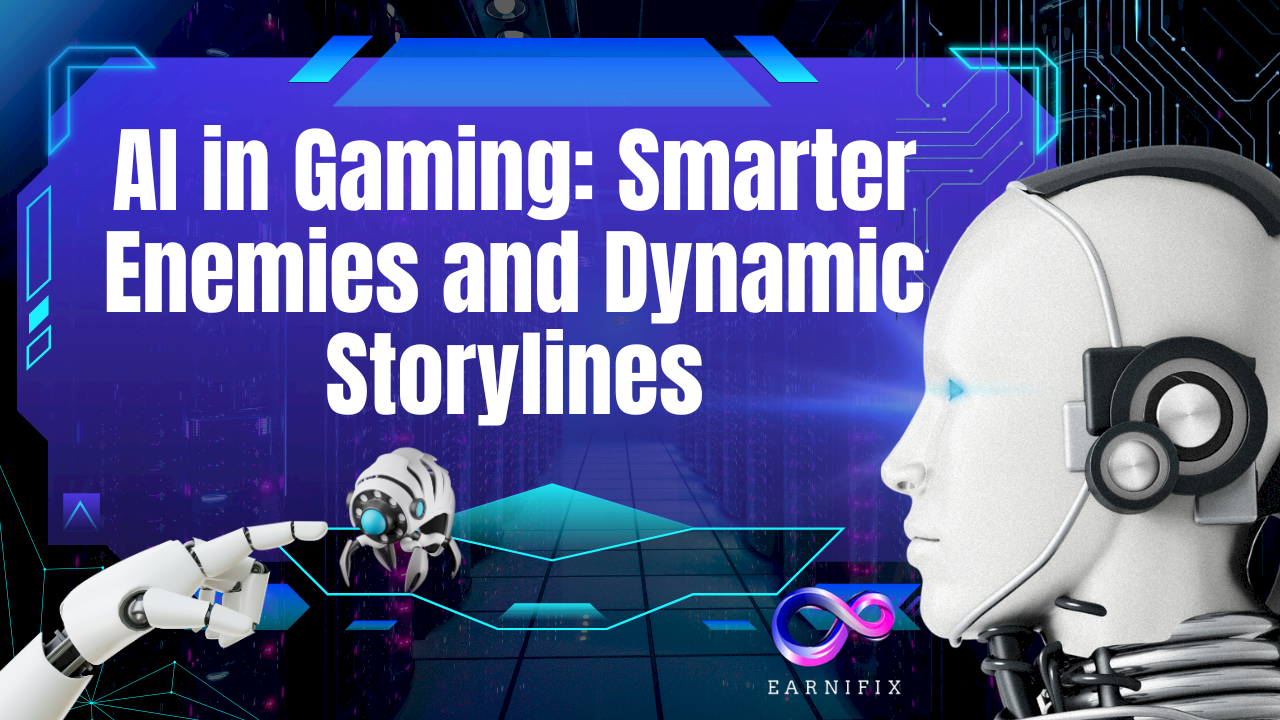
Gaming has always been about immersion. From the earliest pixelated adventures to today’s hyper realistic open worlds, developers have pushed technology to make games more engaging. But in 2025, one technology stands out as a true game changer: Artificial Intelligence (AI).
AI in gaming isn’t just about making enemies harder to beat. It’s about creating smarter opponents, adaptive gameplay, and dynamic storylines that evolve with the player’s choices. This means no two players will ever have the exact same experience.
In this guide, we’ll explore how AI is reshaping video games, the technology behind smarter NPCs and branching narratives, and what the future of AI-powered gaming looks like.
What is AI in Gaming?
Artificial Intelligence in gaming refers to the use of algorithms and machine learning to create non player characters (NPCs), enemies, and environments that can learn, adapt, and interact with players in realistic ways.
Unlike scripted behaviors of the past, modern AI makes games:
- Less predictable
- More challenging
- Deeply personalized
✅ Example: In The Last of Us Part II, enemies communicate, call out each other’s names, and adjust strategies based on the player’s actions, something that would be impossible without AI-driven design.
Smarter Enemies: Beyond Scripted Behavior
For decades, video game enemies worked on predictable patterns. In early arcade shooters, enemies followed fixed movement paths. In stealth games, guards would patrol in loops and instantly forget about players once out of sight.
But now, thanks to AI, enemies are:
- Adaptive: Learning from the player’s strategies.
- Collaborative: Working in groups, using tactics.
- Unpredictable: Forcing players to stay alert.
Examples of Smarter Enemies
1. Halo series (AI-driven squads): Enemy factions use cover, flank players, and retreat when outnumbered.
2. Alien: Isolation: The alien is powered by a two layer AI system, one controls its general movements, while another ensures it always feels close to the player, creating constant tension.
3. Middle earth: Shadow of Mordor (Nemesis System): Enemies remember past encounters with players, hold grudges, and adapt in future battles.
This level of intelligence transforms enemies from disposable obstacles into memorable characters.
Dynamic Storylines: Personalized Gaming Experiences
One of the most exciting uses of AI in gaming is dynamic storytelling. Instead of following a single fixed plot, games can now adjust the story based on player choices, actions, and behavior.
How AI Powers Storylines
- Branching Narratives: Storylines that split depending on decisions (e.g., saving or abandoning a character).
- Procedural Storytelling: AI generates new quests, events, or dialogue in real time.
- Character Adaptation: NPCs react differently depending on how you treat them.
✅ Example: In Detroit: Become Human, every decision alters the course of the narrative, creating hundreds of possible endings. AI tracks player choices to weave a story that feels personal.
AI and Procedural Generation
Procedural generation isn’t new, games like Minecraft and No Man’s Sky used it to create massive worlds. But AI makes procedural generation smarter and more meaningful.
Levels and maps can adapt to a player’s skill.
Enemy spawns can change depending on playstyle.
Quests and dialogue can be auto-generated to keep things fresh.
This means games won’t just be large, they’ll be alive.
Benefits of AI in Gaming
1. Replayability – No two sessions feel the same.
2. Immersion – Smarter NPCs make the world more believable.
3. Challenge – AI can scale difficulty in real-time.
4. Creativity – Developers can focus on design while AI generates content.
5. Personalization – Games adapt to your choices, making each experience unique.
Challenges of AI in Gaming
Of course, there are obstacles:
- Performance: Advanced AI requires powerful hardware.
- Complexity: Balancing adaptive AI can be difficult (too hard or too easy).
- Development costs: Training AI models can be expensive.
- Ethical questions: If NPCs become too “human like,” do they deserve ethical consideration?
AI in Multiplayer Games
While AI shines in single player experiences, it’s also revolutionizing multiplayer.
- AI Coaches: Analyze gameplay to suggest improvements.
- Smarter Bots: Fill in for missing teammates with realistic behavior.
- Anti Cheat Systems: Detect suspicious activity faster than traditional tools.
✅ Example: In competitive esports, AI is used to monitor player actions, catching cheaters in real time.
The Future of AI in Gaming
Looking ahead, AI in gaming will become:
- Hyper personalized: Games that adapt entirely to each player’s style.
- Emotionally intelligent: NPCs that detect tone of voice and facial expressions in VR.
- Collaborative: AI teammates that feel like real partners.
- Generative: Worlds that build themselves infinitely using AI.
By 2030, we may see fully AI-directed games where the story, levels, and NPCs are completely unique for every player.
Conclusion
AI has already transformed gaming, but the best is yet to come. From smarter enemies that learn your every move to branching storylines that reflect your choices, AI ensures that the future of gaming will be more immersive, challenging, and personal than ever before.
As developers harness this technology, players can expect richer, more dynamic adventures where the line between scripted storytelling and emergent gameplay completely disappears.
So the next time you outsmart a virtual enemy or see a game character remember your past choices, remember: that’s AI at work.
anniedynamite
Nice one guys
henrietta
Wow gaming is more engaging
mandy
Gaming is good.
leesha
This is an interesting game
angel23
This is breath taking